The Story of Nastagio degli Onesti II, c.1483 Sandro Botticelli (1445-1510)
Location: Prado Museum Madrid SpainOriginal Size: 82 x 138 cm
Own a museum-quality reproduction of The Story of Nastagio degli Onesti II by Botticelli (c.1483), exclusively hand-painted in oils on linen canvas by European artists with academic training. Each masterpiece is created with meticulous craftsmanship, capturing the exceptional quality and authentic brushwork of the original painting.
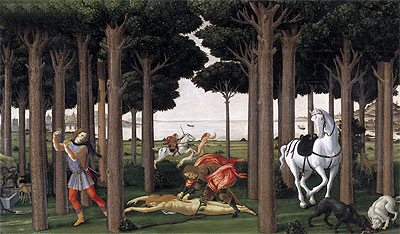
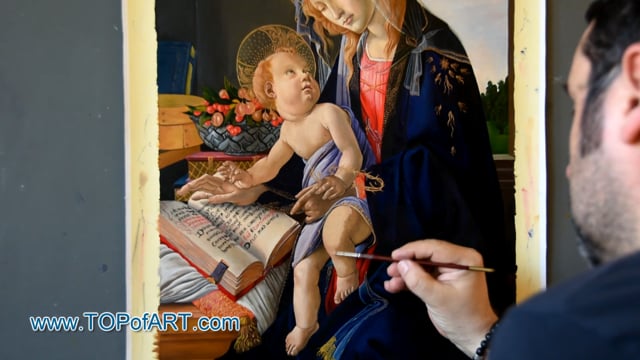
Recreating Botticelli: A Video Journey into Museum-Quality Reproductions by TOPofART
Video showcasing the process of hand-painting a Botticelli masterpiece with the utmost precision and care for detail.
Oil Painting Reproduction
If you want a different size than the offered
Description
Painted by European Аrtists with Academic Education
Museum Quality
+ 4 cm (1.6") Margins for Stretching
Creation Time: 8-9 Weeks
Creation Process
We create our paintings with museum quality and covering the highest academic standards. Once we get your order, it will be entirely hand-painted with oil on canvas. All the materials we use are the highest level, being totally artist graded painting materials and linen canvas.
We will add 1.6" (4 cm) additional blank canvas all over the painting for stretching.
High quality and detailing in every inch are time consuming. The reproduction of Sandro Botticelli also needs time to dry in order to be completely ready for shipping, as this is crucial to not be damaged during transportation.
Based on the size, level of detail and complexity we need 8-9 weeks to complete the process.
In case the delivery date needs to be extended in time, or we are overloaded with requests, there will be an email sent to you sharing the new timelines of production and delivery.
TOPofART wants to remind you to keep patient, in order to get you the highest quality, being our mission to fulfill your expectations.
We not stretch and frame our oil paintings due to several reasons:
Painting reproduction is a high quality expensive product, which we cannot risk to damage by sending it being stretched.
Also, there are postal restrictions, regarding the size of the shipment.
Additionally, due to the dimensions of the stretched canvas, the shipment price may exceed the price of the product itself.
You can stretch and frame your painting in your local frame-shop.
Delivery
Once the painting The Story of Nastagio degli Onesti II is ready and dry, it will be shipped to your delivery address. The canvas will be rolled-up in a secure postal tube.
We offer free shipping as well as paid express transportation services.
After adding your artwork to the shopping cart, you will be able to check the delivery price using the Estimate Shipping and Tax tool.
Museum Quality
The paintings we create are only of museum quality. Our academy graduated artists will never allow a compromise in the quality and detail of the ordered painting. TOPofART do not work, and will never allow ourselves to work with low quality studios from the Far East. We are based in Europe, and quality is our highest priority.
Additional Information
We’re immediately struck by the dense verticality of those towering, slender pine trees, their trunks forming a visual grid that slices the composition into neat segments. These trees are like silent sentinels, unmoved by the horror unfolding at their feet. Notice how Botticelli uses these arboreal pillars to create a rhythm - both natural and rigid - giving the chaotic scene an unnerving order. It's unsettling, really, this dance between control and violence. Amidst the straight lines of the trees, the figures twist and writhe, breaking that strict geometry. There’s the knight, with his cloak aflame in reds and oranges, relentlessly attacking a fallen woman, her form draped helplessly on the forest floor.
The palette is rich but controlled. Reds, browns, and soft greens dominate, grounding the fantastical elements in the kind of earthy realism that makes the scene all the more disturbing. Those reds - just look at them. They leap off the canvas, almost visceral in their intensity. The pale woman’s nude body is a stark contrast, her skin almost too luminous, too fragile against the dark, unfeeling forest.
Compositionally, Botticelli orchestrates the chaos with surgical precision. The action is concentrated toward the center, the violence unfolding within a sea of calm, as though nature - and the distant horizon - remains indifferent to human cruelty. And in that contrast, Botticelli captures something essential about life: its indifferent, rhythmic cruelty.
This painting doesn’t merely illustrate a story - it traps you inside it.
1 Reviews
5.00 Overall rating
This illustration of a scene in a Boccaccio story was commissioned for the marriage of Giannozzo Pucci and Lucrezia Bini (1483), as indicated by the coats of arms; stylistic examination confirms this dating. The series of panels is by Botticelli in concept and design, but the execution is mainly studio work and critics recognize in it the collaboration of Bartolomeo di Giovanni. Botticelli had come back from Rome in 1482 famous for the work he had done there and, overloaded with commissions, was obliged to hire assistants. Certainly the drawing is very fine - "all alive with delicate and pungent graces" (Bettini) - and reflects the narrative ability of the master and his penetrating intuition in translating the original novella. In it, Boccaccio tells the tale of an unrequited lover who changes his lady's mind: he made her visualize hell and the perpetual torment of a cruel woman by the lover who had suffered damnation for her. In the detail reproduced here, the youth is seen pursuing the nude girl; he knocks her to the ground, tears out her heart, throws it to his dogs, then starts the pursuit and torture again, the cycle continuing through eternity. Without question it is the most beautiful of the panels. The view recedes from the shore of Classe to the far distant horizon which divides the scene into two areas equal in size but entirely different in intensity. Vertically, the picture is punctuated at varying intervals by the tall pine-trees supporting their green, mushroom-shaped tops. The elegant figures move amid these geometric coordinates, and the fantastic narration is achieved effortlessly in a play of intricate rhythms.
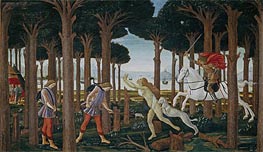
The Story of Nastagio degli Onesti I c.1483
$4684
$96.88
Sandro Botticelli
Original Size:83 x 138 cm
Prado Museum, Madrid, Spain
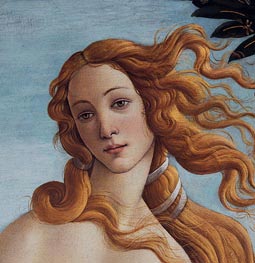
Venus Head - Detail from The Birth of Venus c.1485
$1508
Sandro Botticelli
Original Size:83 x 138 cm
Galleria degli Uffizi, Florence, Italy
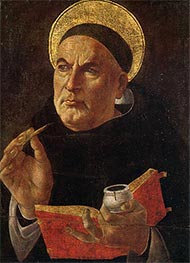
St. Thomas Aquinas c.1480/85
$2010
Sandro Botticelli
Original Size:51 x 38 cm
Public Collection
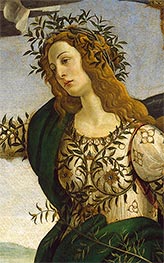
Athene - Detail from Athene and the Centaur c.1480
$2007
$65.95
Sandro Botticelli
Original Size:51 x 38 cm
Galleria degli Uffizi, Florence, Italy
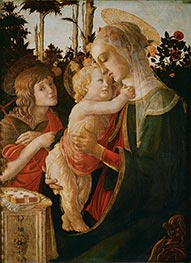
Madonna and Child with the Young St. John the Baptist c.1468
$3648
$72.68
Sandro Botticelli
Original Size:90.7 x 67 cm
Louvre Museum, Paris, France